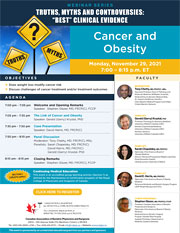
Sarah Chapelsky, MD, FRCP(C)
Diplomate of the American Board of
Obesity Medicine
Director, Women's Preoperative Weight Loss Clinic,
Royal Alexandra Hospital
Clinical Lecturer, University of Alberta
Dr. Sarah Chapelsky completed her undergraduate medical degree and internal medicine training at the University of Calgary, followed by a fellowship in general internal medicine at the University of British Columbia. Now based in Edmonton, she is a general internist at the Edmonton Adult Bariatric Specialty Clinic, a hospital-based medical and surgical program; medical lead of FEMME HOMME Weight Management Program, an intensive community-based program; Clinical Lecturer at the University of Alberta Department of Medicine; and Diplomate of the American Board of Obesity Medicine.

David E. Harris, MD, FRCP(C)
Diplomate of the American Board of Obesity Medicine
Richmond Metabolic and Bariatric Surgery Program
LEAF Weight Management Clinic
Dr. Harris is an Endocrinologist and General Internist trained at the University of British Columbia. He has completed the American Boards in Obesity and Bariatric Medicine. He works as a medical director of the Richmond Metabolic and Bariatric Surgery Program in Richmond, BC, for the past 6 years, and still remotely today.
Recently, his family relocated to Ottawa, and he has joined the LEAF Medical Weight Management Clinic. Dr. Harris enjoys teaching physicians in obesity and bariatrics, and participates in conducting clinical research - mainly studies in the bariatric surgery process, diabetes, and immunology integrated with clinical obesity studies. His future research goals include pharmacological studies of obesity, and also studies of brown and beige adipose tissue.

Gerald (Gerry) Krystal, PhD
Professor, Pathology & Laboratory Medicine,
University of British Columbia (UBC)
Member, Experimental Medicine,
University of British Columbia (UBC)
Member, Genetics,
University of British Columbia (UBC)
Our lab is interested in the effects of various diets on cancer (CA) incidence and progression. Since tumour cells are more dependent on blood glucose than normal cells for their growth, we have been testing low carbohydrate (CHO) diets on mice and found they reduce the incidence, growth rate and metastasis of primary tumours. Related to this, we have been studying ways to alter the properties of the immune cells within tumours to enhance their ability to kill the CA cells. Because many tumours secrete factors that subvert the ability of tumour-infiltrating immune cells to kill CA cells, we have been examining the effects of different immune modulating agents and found that low levels of non-steroidal anti-inflammatory drugs like Celebrex, or omega 3 fatty acids, in conjunction with our low CHO diets, dramatically reduce the growth rate of tumours.
We are also interested in determining who is at risk of developing CA so we can prevent it by adopting life style changes. In regard to this goal, there is growing evidence that sub-clinicial levels of chronic inflammation (CI), coupled with a poor immune response to viral infections, increase the incidence of many human CAs. Thus the identification of individuals with low but detectable levels of CI and a poor anti-viral response would be of great value in indentifying high-risk people. As well, recent research has shown that what we eat determines the type of bacteria that reside in our gut (i.e., our gut microbiome) and these bacteria likely play an important role in determining our levels of CI. Lastly, macrophages (MФs), which are key immune cells in all our tissues, vary from person to person in their properties, from being skewed to very pro-inflammatory (M1 or killer MФs) in some people to very anti-inflammatory (M2 or healer MФs) in others, with most people being somewhere in between. Since MФs secrete many immune modulators, where on this spectrum a person’s MФs exist profoundly influences his/her level of CI and ability to fight off infections.
To explore all these areas further we have devised a series of simple tests in which very small amounts of whole human blood are both tested for markers of CI and incubated for 7 hours in the presence and absence of live bacteria and viruses to assess an individual’s immune response. As well, small fecal samples are analyzed to determine the bacterial makeup of our gut in order to relate the presence of specific bacteria with levels of CI to gain insight into which bacteria may be beneficial and which may be harmful. Ultimately, we hope to identify specific immune markers that can be used to predict an individual’s susceptibility to developing CA.
We are also interested in searching for nature-derived compounds that may be used to modulate our immune responses to prevent or treat CA and, lastly, since we have recently elucidated the factors in mouse blood that dramatically influence the skewing of MФs we would now like to determine if the same factors play a role in skewing human MФs. Identifying them would enable treatments to reduce CI and fight off infections and CA cells more effectively.
 Objectives
Objectives






